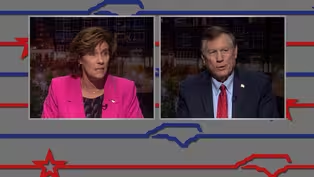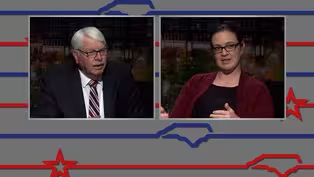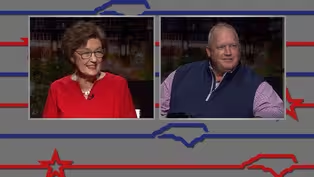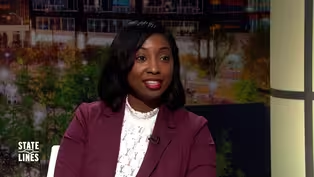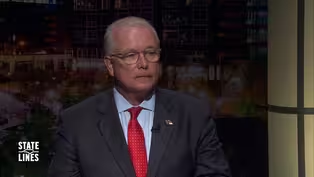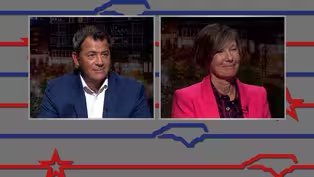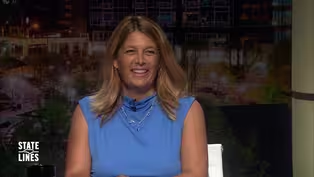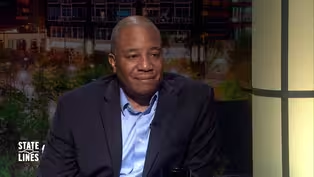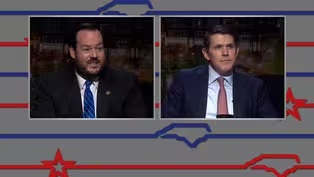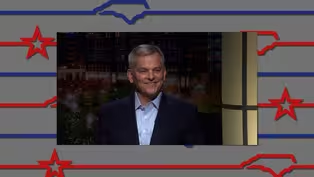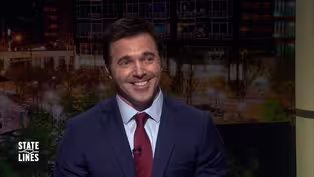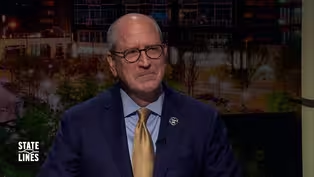
2024 NC Commissioner of Labor Candidates
Special | 26m 46sVideo has Closed Captions
Luke Farley (R) and Braxton Winston II (D) discuss their campaigns for NC Commissioner of Labor.
Candidates Luke Farley (Republican) and Braxton Winston II (Democrat) discuss their campaigns for NC Commissioner of Labor. Hosted by PBS NC’s Kelly McCullen, these interviews were recorded on July 26 and July 31, 2024.
Problems playing video? | Closed Captioning Feedback
Problems playing video? | Closed Captioning Feedback
State Lines is a local public television program presented by PBS NC

2024 NC Commissioner of Labor Candidates
Special | 26m 46sVideo has Closed Captions
Candidates Luke Farley (Republican) and Braxton Winston II (Democrat) discuss their campaigns for NC Commissioner of Labor. Hosted by PBS NC’s Kelly McCullen, these interviews were recorded on July 26 and July 31, 2024.
Problems playing video? | Closed Captioning Feedback
How to Watch State Lines
State Lines is available to stream on pbs.org and the free PBS App, available on iPhone, Apple TV, Android TV, Android smartphones, Amazon Fire TV, Amazon Fire Tablet, Roku, Samsung Smart TV, and Vizio.
Providing Support for PBS.org
Learn Moreabout PBS online sponsorshipMore from This Collection
During major election cycles, PBS North Carolina's public affairs team sits down for in-depth conversations with candidates running for Governor and Council of State positions. PBS North Carolina has invited major party candidates to a one-on-one interview with State Lines host and executive producer Kelly McCullen. Interviews are scheduled throughout the summer.
2024 NC Commissioner of Insurance Candidates
Video has Closed Captions
Mike Causey (R) and Natasha Marcus (D) discuss their campaigns for NC Commissioner of Insurance. (26m 46s)
2024 NC Commissioner of Agriculture Candidates
Video has Closed Captions
Sarah Taber (D) and Steve Troxler (R) discuss their campaigns for NC Commissioner of Agriculture. (26m 46s)
2024 NC Secretary of State Candidates
Video has Closed Captions
Elaine Marshall (D) and Chad Brown (R) discuss their campaigns for NC Secretary of State. (26m 46s)
Jessica Holmes, Democratic Candidate for NC Auditor
Video has Closed Captions
An interview with Jessica Holmes, Democratic candidate for NC Auditor (2024). (12m 32s)
Dave Boliek, Republican Candidate for NC Auditor
Video has Closed Captions
An interview with Dave Boliek, Republican candidate for NC Auditor (2024). (12m 58s)
2024 NC Lieutenant Governor Candidates
Video has Closed Captions
Hal Weatherman (R) and Rachel Hunt (D) discuss their campaigns for NC Lieutenant Governor. (26m 46s)
Michele Morrow, Republican Candidate for NC Superintendent of Public Instruction
Video has Closed Captions
An interview with Michele Morrow, GOP candidate for NC Superintendent of Public Instruction (2024). (12m 57s)
Maurice "Mo" Green, Democratic Candidate for NC Superintendent of Public Instruction
Video has Closed Captions
An interview with Mo Green, Democratic candidate for NC Superintendent of Public Instruction (2024). (13m 7s)
Video has Closed Captions
Wesley Harris (D) and Brad Briner (R) discuss their campaigns for NC Treasurer. (26m 46s)
Video has Closed Captions
Josh Stein (D) discusses his campaign for NC Governor. (26m 46s)
Jeff Jackson, Democratic Candidate for NC Attorney General
Video has Closed Captions
An interview with Jeff Jackson, Democratic candidate for NC Attorney General (2024). (12m 50s)
Dan Bishop, Republican Candidate for NC Attorney General
Video has Closed Captions
An interview with Dan Bishop, Republican candidate for NC Attorney General (2024). (12m 44s)
Providing Support for PBS.org
Learn Moreabout PBS online sponsorship- We meet Republican Luke Farley and Democrat Braxton Winston.
They are nominees for North Carolina Commissioner of Labor on this special election 2024 edition of "State Lines".
[upbeat music] [upbeat music continues] Hello there.
I'm Kelly McCullen.
This "State Line" special will introduce us to the candidates for North Carolina's Commissioner of Labor, the State Commissioner of Labor Office.
Well, the commissioners serve four year terms.
They don't face term limits.
It does a lot of things, this position.
It regulates youth employment rules, can handle wage complaints, discrimination issues, and then most visibly labor department officials oversee state fair ride safety and elevator safety.
So a lot to talk about.
And joining me is Luke Farley, the GOP nominee for North Carolina Labor Commissioner.
Sir, good to have you on the "State Lines" set.
- Kelly, thank you for having me.
Thanks for your interest in this race.
- We are very interested in it.
The voters deserve to know all the Council of State candidates.
Tell us about you.
Primary voters would know you, they voted for you, but everyone else whose vote you need, who's Luke Farley?
- Luke Farley is somebody who wants North Carolina to become a magnet for good paying jobs.
You know, I'm coming at this office for labor commissioner with one main goal in mind.
That's to keep our workers safe and healthy without bankrupting our businesses in the process so that this state is the number one state in business in the country.
- Why does business threat or business fiscal threat pair with employee safety?
Why do you say it that way?
Don't bankrupt businesses, protect workers.
- Protect workers without bankrupting businesses in the process, because this office can be North Carolina's secret weapon for economic development.
Here's what I mean by that.
So if this office is well run, if our labor and employment laws are enforced in a fair and even-handed way, it tells people this is a place you wanna do business.
Come do business in North Carolina.
And when business comes here, that means jobs.
Jobs mean salaries paid, mortgages paid, rent paid, groceries bought, clothes for kids.
And that's what's driving me to run for this office.
You know, I think about what North Carolina's gonna be like in 20 years.
I got two young sons, seven and two.
I got another baby on the way in a week actually.
And I think about what's North Carolina gonna be like for them in 20 years?
Because for me it's been a fantastic place with endless opportunity.
You know, own a home, start a career, get married, have a family, but there's a lot of competition out there from other states, from other countries.
And I wanna make sure that North Carolina is a place for my kids, your kids, the kids of everybody watching that, there's as much opportunity for them as there has been for me.
And that's what really drives me to run for this office.
- And business climb, it was Forbes I think, rated as barely number two behind Virginia - That's right.
- and business climate.
So you know, you're trying to gain that one extra one half of 1% if we were to follow your platform.
So how are labor laws being administered in this state currently?
- Well, they're being administered smartly, right?
We have had 24 good years, first 20 years with my friend Cherie Berry, The Elevator Queen, as a lot of your viewers may know, a friend of mine who's endorsed me, then four years with our current commissioner, Josh Dobson.
But 24 good years of common sense leadership at the Labor Department.
And we need to keep going in that direction.
I'm gonna be a commissioner in the mold of Cherie Berry and Josh Dobson doing that common sense leadership that promotes job growth in North Carolina.
- I saw where you're an OSHA lawyer, so you're in worker safety or representing businesses with OSHA, which is it?
What does that job mean in the private sector?
- Yeah, so I have a wealth of experience working with the laws and regulations that this department enforce.
You know, I'm not a politician.
I'm coming outta the private sector and I want to take that private sector experience I've gained and make North Carolina a better place with it.
And that private sector experience is working with our state's labor and employment laws.
The work I've done has made workers safer and healthier and businesses more secure.
Now I wanna take that experience and bring it to the whole state.
- Generally people will say a Democrat's a pro-working person.
The pro-worker and Republicans are pro-business and business development.
Where do you fall on that and how should the everyday voters, they look down that ballot, they look at your name and they go, "Is he for the man that owns the factory or is he for the person working for the man, if you will?"
- I'm for both, and you need to be for both, right?
You can't be pro worker if you don't care about their jobs.
You want every worker in this state to have a safe, good paying, high quality job.
And that's the way I approach this job as Labor Commissioner.
You know, you need a balanced approach to drive the economy forward here.
It's our businesses that create the jobs, it's our workers that keep the businesses running.
And the Labor Department needs to take a balanced approach that doesn't favor one side too much or the other because then things get out of kilter.
I wanna balanced equation in how we enforce our laws.
And I think that signals to people, this is a place you wanna do business, bring your jobs here.
- Cherie Berry was an externally focused labor commissioner.
People knew her.
They wrote the song about her.
And there was some fun with that several years ago.
Josh Dobson was a very quiet leader, it seemed, you know, put his head into the department, worked hard and is handing it off to either you or the Democrat.
What kind of leader are you?
And if you're elected, are you gonna be someone we're gonna see out in the public sphere, or is the best work quietly done inside the department?
- It's a mix of both.
People deserve to know who their labor commissioner is, who's out there working for them.
- What's your style though?
- Yeah, I would say my style is a mix of both.
I wanna be out there, rolling up my sleeves, digging into the technical issues of the department.
That's what my background is in.
So I am well prepared to deal with the hard technical issues that the department faces, but I also wanna be out there with the folks, learning their jobs, learning the industries that the department regulates.
I think that is so key.
And that's what I've been doing in my campaign.
We visited farms, factories, manufacturing plants, construction sites.
I think the Labor Commissioner needs to understand the full range of what department does and the work that our workers are doing in the industries that we have in North Carolina.
And I'm already doing that.
- Do you think Labor Commissioners should be at the General Assembly advocating for certain laws, certain business and employment laws, or should it lay back, allow the General Assembly to pass legislation and then interpret it and enforce it?
- Well, the General Assembly is the policymaking branch of government in this state, and that's their primary responsibility.
The primary responsibility of the Labor Commissioner is to carry out those laws.
And so my primary focus is gonna be doing the job that the state constitution assigns to me, which is enforcing our state's labor and employment laws.
But where there's a need for tweaks, where there's a need to be an advocate, for instance, a vocational technical education, you will always find me being a strong advocate for that, whether it's at the General Assembly, whether on the Board of Community Colleges.
I think we need to get back to helping people get jobs where they work with their hands.
You know, that has been marginalized in our society.
And that's something I'll be advocating for as Labor commissioner.
- I've heard that plank of people's platforms probably going back eight, 10 years to bring back high paying, but very skilled labor.
But we still talk about it in 2024.
So it's one thing for someone to propose, and it's another to have families believe that a two-year associate's degree in the trades is a valuable investment.
How do we get society to follow along with what Democrats and Republicans say about two-year degrees?
- I think you demonstrate very clearly that, for instance, construction, construction makes more millionaires than any other industry.
It's something where you can take two years, a two-year degree, or two years of vocational and technical training and education and turn that into something where in 10 or 15 years, you can have a business that you can sell.
And we need leaders who are pushing that.
And so, the Labor Commissioner serves on the Board of Community Colleges.
I'll be there every step of the way, saying our community colleges need to be focused on creating these kinds of jobs and preparing people for those kinds of jobs, 'cause they're not the kind of thing that's gonna go away with AI, right?
Lawyers may get replaced by AI, but plumbers, electricians, HVAC technicians, they're not gonna be losing their jobs.
- Would you weigh in on federal issues?
If there's an immigration debate and an immigration crackdown, it's going to affect blue collar job positions in this state, no doubt about it.
Where do you see your role in that, if A, if immigrants come in, they're taking some jobs, and if immigrants roll out, they're opening holes that may not be filled?
- Well, I mean the number one job of the Labor Commission is to keep our workforce safe and healthy and to look after the general wellbeing of the workforce in North Carolina.
And that's a sacred responsibility, right?
Our people in North Carolina are our strength.
And I will always be advocating for what's best for the workers in North Carolina to keep 'em safe, healthy, and prosperous.
- Is there one policy you would like to absolutely see passed and implemented as labor commissioner, that as a lawyer, you say this is a missing part of labor regulations that is needed and it's sensible?
And there's a million regulations out there, I don't wanna put you on the spot with, but is there somewhere you'd like to see legislators sort of massage to make it either better for workers or better for workers and employers?
- I think the policy that we need to advocate most strongly for is making sure we filled all the positions in the labor department, right?
I mean, we have a labor department, there are some vacancies there and it makes it harder to carry out our job.
It puts more strain on the people who are in the department now, the employees there.
You know, if you've got eight people doing the job of 10, that's tough.
So the number one priority as a policy perspective for me is to make sure we filled all the vacancies and that we have an adequate number of safety and health inspectors for our workers, also our elevator inspectors, amusement ride inspectors, you mentioned that earlier.
So that's the number one thing I'll be focused on from a policy perspective is making sure positions are filled and the job's getting done for the people in North Carolina.
- Is there any chance you could work smarter?
Because small government means less jobs, means make it work with what you have.
- Absolutely.
We will do what we can with the resources we've got, and I do think that sometimes we just have to do more with less.
This is a common problem in the public sector, private sector.
It is hard to fill jobs right now, and we will do more with less and we'll be creative.
Maybe there's some uses for technology, AI or algorithms to help us direct health and safety inspections to those employers that are most likely to violate our health and safety laws.
And I'm certainly open to doing that.
You're right, that's a conservative approach.
But I think filling those vacancies is probably as a policy matter, the number one.
- You know, the COVID era has passed us, the pandemic has passed us as a pandemic.
And so I don't wanna relitigate three, four years ago with policies that were controversial, but public health is an issue.
You brought it up during the primary, your campaign literature talks about masking, vaccines, paid time off, state rules that could address a future pandemic.
- Yes.
- How closely should you work with the Department of Health and Human Services of either type of administration, Republican or Democrat, to keep workers safe, if that requires mandates?
- Yeah, we'll listen to anybody out there and we'll take stock of what the stakeholders say.
But this department's gonna be focused on carrying out our mandate, which is to keep the workers safe and healthy, and I think without bankrupting businesses in the process.
As I say, we've got to have a balanced approach to protecting workers, to drive the economy forward.
You know, you mentioned vaccines and things like that.
That's something, raised it in the primary, and it's something we're gonna keep an eye on.
We're gonna make sure that workers are protected, but without being overburdened by mandates, masks, and things like that, - Where do you see the economy going and the workforce going in North Carolina in the next, well, we'll start with four years, let's look out to eight?
- Well, the plan is to get in there as your next labor commissioner and keep our workforce safe and healthy with common sense regulation that drives job growth.
You know, that's what people have to understand is jobs don't just materialize outta nowhere, right?
They're created, and they're created under certain good conditions.
We have good conditions in North Carolina.
We need to keep those conditions going.
- And a lot of businesses will come to you and to the legislature and say, "Well, if you regulate us at all, it's gonna cost jobs."
How do you weigh the counterpoint to make good, sensible regulatory decisions?
- Absolutely.
- How do you do that?
- That's what I'm saying.
It's a balanced approach.
We need some regulation.
Of course.
Of course.
And we have a lot of regulations on the books.
It's about common sense enforcement of them and effective enforcement in a way that protects our workers.
And so you do that by targeting the people most likely to do bad things.
You know, there are absolutely bad apples and bad actors out there.
And when I'm labor commissioner, they're gonna get the book thrown at them.
But everybody else, we wanna work with them to help them do the right thing to keep their employees safe and healthy.
- This is Luke Farley, GOP nominee for North Carolina Labor Commissioner.
He'll be on your statewide ballot, down just a bit from Harris and Trump, but be there nonetheless.
Stick through it, cast a vote either way, and fill that ballot out.
Mr. Farley, thank you so much for being on this show.
- Thanks again for your interest in the race.
Good to see you.
- Pleasure to meet you, and we are interested in the race.
Well, absentee ballots will start being mailed out in early September.
However, early in-person voting begins October 17th, 2024.
So write that down if you'd like to vote early.
It will run through and end on November 2nd, 2024.
Everything shuts down for a few days.
Traditional election day is November 5th.
That will also be the deadline that you should have your absentee ballot received by local elections offices.
It's a big deal and a big deadline.
And if you vote, you'll be asked to present a photo identification.
[upbeat music] Let's welcome to "State Lines" Democratic candidate for Commissioner of Labor, Braxton Winston II, exactly how that name will appear on the ballot.
Mr. Winston, good to have you.
- Great to be here.
Thank you for having me.
- Well, you were a local leader in the Charlotte area and are, but you're running a statewide race, so a lot of voters may not be familiar with who you are.
They might know your name.
So tell us about yourself and why you're running for labor commissioner.
- Well, I'm probably not your traditional candidate for Commissioner of Labor.
I was born in Camp Lejeune to a guy who retired from the Marine Corps and then retired from the Air Force, and at 64 years old is still riding around on a firetruck, pulling people outta fires.
My mother's a retired high school math teacher.
And when I graduated from Davidson College, I started a career as a union stagehand.
And that's what I've been doing in Charlotte for over 20 years, working backstage on things like rock and roll shows and Broadway shows.
I've been a camera operator for the Charlotte Hornets for 20 seasons, and I work on film and television production sets.
So all that to be said, I understand the challenges that working families face all across this state day to day.
I'm a guy who clocks in and clocks out.
And that, combined with being the former mayor pro tem on the Charlotte City Council, where I served three terms, I've certainly come to understand and believe that our state has everything it takes to be number one for both businesses and workers.
And that's why I'm doing this, 'cause I think we have the potential to do that.
But it's gonna take strong leadership at the Department of Labor to make that a reality - And North Carolina is a right to work state, which I mean, it means it doesn't empower unions, but there are unions in this state and they seem to have influence in certain areas.
Where are unions working in the state and where are they not in terms of the policy and laws?
- We are certainly, we are I think the second least unionized state in the nation, but I always like to tell people, you know, there's really nothing more American than the idea of a union.
I mean, it says it in the preamble of our Constitution.
"We, the people, in order to form a more perfect union, do present this Constitution."
And the Constitution is a collectively bargained contract that sets the framework for how we can negotiate with one another in good faith, a framework where we can set rules and understanding on how to hold each other accountable.
And that is really at the crux of the idea of the labor movement, right?
The idea that workers and employers can have this collectively bargained contract that provides a fair situation for both the employer and the worker.
Frankly, we don't have enough of that fairness in our workforces throughout the state.
And I think it could go a long way, again, to making us the number one state for businesses and workers if we had a stronger labor movement.
- Let's talk about your platform for labor commissioner.
That's an administrative job in state government, or at least historically it's a quiet job.
I mean, you have your picture in the elevator, if you so wanted, pair your experience with what you wanna do if you're elected.
- Well, I think this job is administrative, but there are also services that it needs to provide.
I think for about 25 years, you've had a Republican leadership at the Commissioner of Labor that has intentionally eroded the work that needs to be done at the Department of Labor.
Look, I was talking to a scrap yard owner in Asheville a couple months back, and they were trying to get a voluntary inspection, health and safety inspection.
They weren't being responded to for three months.
And that makes sense when you realize that one in four, 25% of our safety compliance officers in this state, those positions goes unfilled.
So we really need to, my number one priority is really to make sure that this department is not just fully staffed, but adequately staffed to do the important jobs that needs to be done, whether that are those safety inspections that we rely on, whether it's responding to those reports of dangerous and unhealthy work conditions, or times that workers have been retaliated against or being taken advantage of by their employers.
It's a significant job and one that really does affect us all, 'cause the ties that do bind us, we all work for somebody and we all should be ensured that we're working in fair conditions.
And that is gonna be the focus of my administration.
- I'm looking into the current labor department.
It's an open seat, so the incumbent is not seeking reelection, Josh Dobson.
So you'll inherit a team of folks, many have been there a lot longer than any labor commissioner currently in office and will be there long after Josh is gone.
So what, you inherit a understaffed team, you have to persuade a budget writer to expand your budget.
Every council of state seat seems to complain about job vacancies.
So what's realistic?
What do you expect to get done?
What's the best you can do?
- Well, the best that we can do is to ensure that we are doing our job under the law, right?
And really, you know, kind of to carry on the question that you asked before, I really have focused on building coalitions, right?
There is not one policy that can be implemented that provides a silver bullet to any issue or problem that a government has to face.
So it's important that we work together as a council of state to advocate for the changes that are needed from a system wide perspective.
From the entire state government, it's gonna be important to build coalitions on the General Assembly.
Look, I know from being the mayor pro tem from the great state of Charlotte that it's one thing to work things out in the headlines and it's another thing to get up and get behind those doors and have those meetings and find common ground.
It's also important to make sure that we are working with county and local governments, as well as the private sector and service providing organizations like labor unions to ensure that we are understanding what's going on out in the field and we're actually working to solve the solvable issues that are on the ground.
- I mean, one narrative in the campaign from your opponent, but this is about you, is I wanna have a safe working environment across the state without bankrupting business was the term we use in a previous interview.
To your point, when people look at you and go, "Hey, Democrat, labor guy, union guy," what's the balance with you between representing the worker and representing the business?
- Well, I always tell people you don't become the mayor pro tem of the city of Charlotte without having the trust and belief by leaders in the business sector.
I've been grateful to have the support of of titans like Hugh McColl since I've first come into the public service realm.
Look, again, the idea of taking care of workers and taking care of businesses are not mutually exclusive, right?
Businesses want to set up where their workforce is strong, where their workforce is durable, where their workforce is educated, and workers want their employers to thrive and make a lot money, gain wealth, and grow work.
Workers just want their fair share.
They want to be able to ensure that they're coming home with a fair day's pay after a fair day's work.
They wanna make sure that they have access to water, fresh and clean water, and they can take a break throughout the day, or they are able to protect themselves from the hot sun if they're working outside, or from high heat if they're working inside.
And they wanna be able to do that without being fired or retaliated when they stand up for those things.
And look, if having to provide water to your employees is gonna bankrupt a business, we need to really look at the underlying business model and the fundamentals of that business.
So I think, again, those two ideas are not mutually exclusive.
When workers are taken care of, work happens more efficiently.
When workers are able to stay around in a job for longer periods of time because they're healthy and safe, that is better for the bottom line of the business.
These two things are interconnected and they certainly should not bankrupt a business, let alone an industry.
- You know, you're bringing up some issues about basic worker, the worker experience on certain jobs.
I don't know which jobs you're referencing with water, presuming outdoors, you're in the sun, but then you'll read magazines and they'll label North Carolina as the best place to do business one year, or maybe slightly number two in 2024.
- Sure.
- Are there differences there?
What do you see in the labor and the employment and the economic landscape of the state right now?
- Yeah, it's usually ranked at the top for business, but it's also ranked at the bottom when it comes in terms of workers, you know, and that that relates to pay, benefits package, and the ability to organize.
I mean, Oxfam ranked us 52 outta 52, I believe, for the conditions of women workers behind Puerto Rico and Washington, DC.
When it comes down to it, and as you saw, we've slipped in the rankings.
We fell from number one to number two, and it's because we're not investing in the infrastructure necessary to sustain our workforce.
We're not investing in the public education that is going to support the skills our workforce is going to need for the jobs that are coming down tomorrow.
And we rank something like 35th in terms of overall quality of life.
That's why the political philosophy that I have that undergirds this campaign is something we call a whole worker approach, that certainly at the Department of Labor, we need to focus on our jurisdiction for what happens in the workplace.
But there are things outside the workplace that really do affect the work, health and safety, and the vitality of a workforce, right?
If workers aren't going home to healthy and affordable housing, work is not gonna be sustainable.
Work doesn't work without the access to affordable childcare.
Work doesn't work when workers live in the digital divide or don't have access to the healthcare, both mental and physical.
So that's why we need to work across the board to ensure that we have the kind of underlying factors that have sustained our workforce over generations, but I think in some places we've taken our eye on the ball and that falling in rankings really does show us we need to invest in the whole worker to ensure that we have everything that's needed so business can continue to grow and we can have the upward economic trajectory that we enjoy now long into the future.
- You know, very rarely do I see in North Carolina headlines being generated based on labor rules and proposed rules.
One was the mask mandate, the COVID rules.
I hope we never have another pandemic.
As a journalist, I will say I am in favor of never having another one.
- Yeah, I agree.
- However, it does bring up a partnership opportunity when hurricanes, tornadoes strike, or pandemic strike, what do you see is the Labor Department's role in being at the table if the debate over health mandates comes up again in the private sector?
- Well, I'm glad you brought that up because I was in municipal government at the pandemic onset, and really there were no rules for, there was no playbook for state and local of officials in terms of how to handle the pandemic.
The pandemics were supposed to be the job of the federal government.
And when the federal government dropped the ball, it was up to us and state and local government to create a playbook.
And governments are run by laws and policies.
And when those policies didn't, we looked at the book and there were no policies that govern our response.
It made clear that we have to work together to create that playbook for when challenges and emergencies do come on down the line.
We know how to flip the switch on and get to work.
I think it's gonna be important that we have connections going both up and down right at the Department of Labor.
How do we work with our federal partners that have a much more robust network and much more robust toolbox in some situations, but how do we also reach down to the municipalities and the county level to understand what is going on specifically and what are the needs in specific areas so we can have, again, comprehensive policy responses when future emergencies come forward?
- So on the state ballot, Braxton Winston II for Labor Commissioner.
- That it Correct.
- there'll be an option there, folks.
Make sure you go all the way down the ballot.
- Gotta go all the way down the ballot.
- Yeah, don't get put off by the governor and presidential race.
- Absolutely.
- You got a lot of folks asking for the job.
Thank you so much, Mr. Winston, for being on "State Lines" of special edition.
- Thank you for having me.
- And thank you for watching us, folks.
For more voting information, visit our website, pbsnc.org/vote.
I'm Kelly McCullen.
Thank you for watching.
[gentle music] [gentle music continues] - [Presenter] Quality public television is made possible through the financial contributions of viewers like you who invite you to join them in supporting PBS NC.

- News and Public Affairs

Top journalists deliver compelling original analysis of the hour's headlines.

- News and Public Affairs

FRONTLINE is investigative journalism that questions, explains and changes our world.












Support for PBS provided by:
State Lines is a local public television program presented by PBS NC
